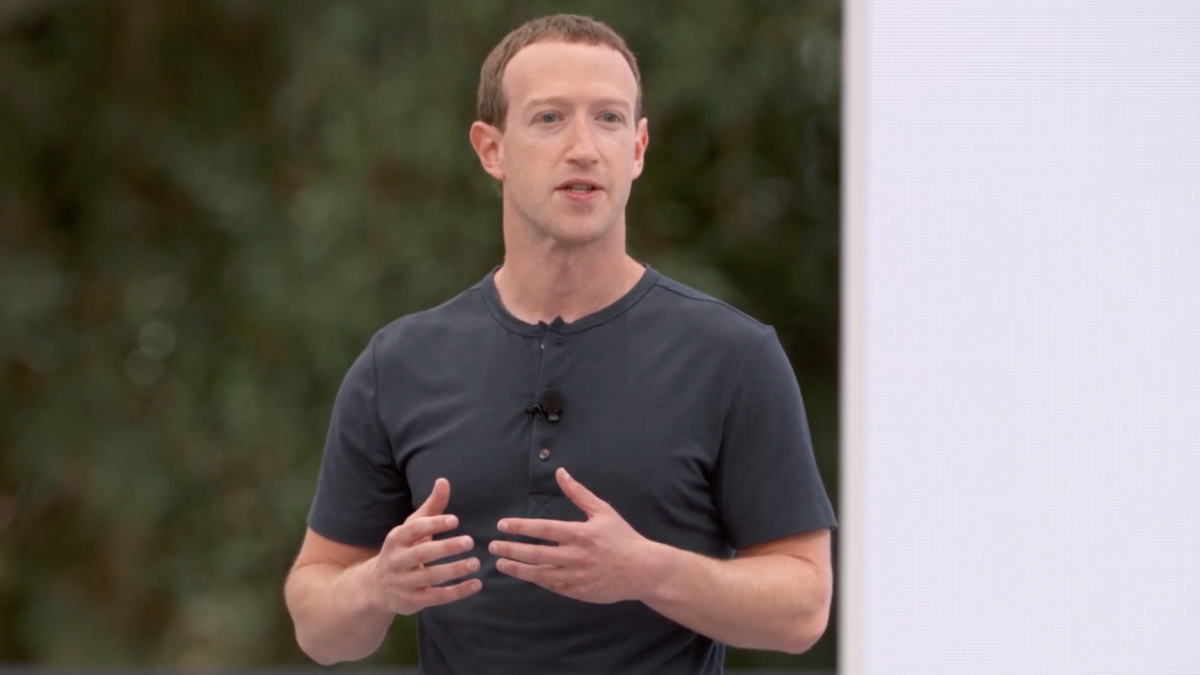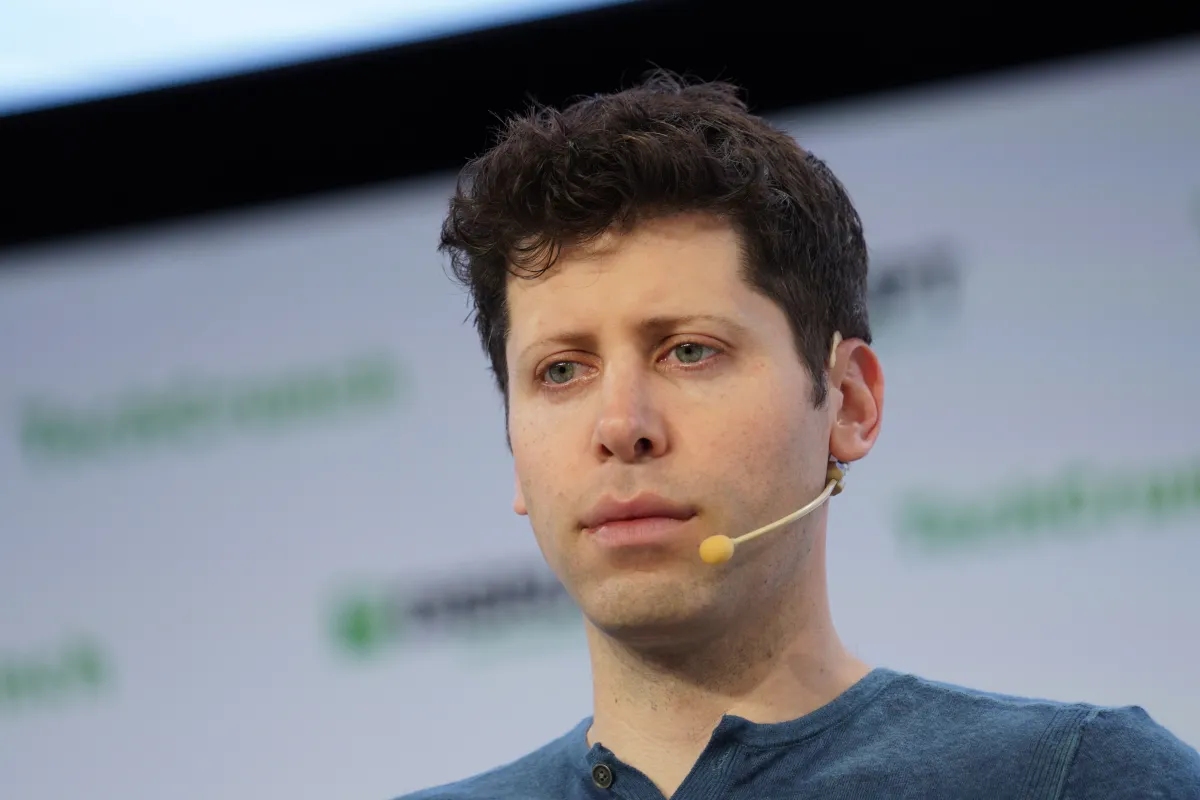
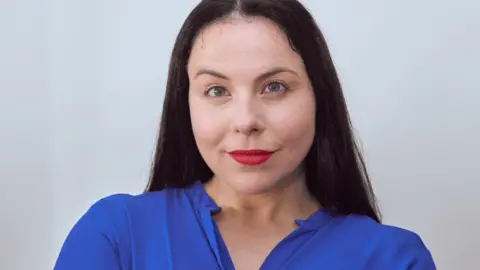 Amy Lieboutz
Amy LieboutzIt does not matter how much you prepare for that. It still takes you by surprise. As a granddaughter of a woman who was killed in Auschwitz, I meet the granddaughter of the man who led the Jews to die. I lost words.
I was never able to meet my grandfather Ludwig, who survived the Holocaust, or his mother Rachel. They were placed on a livestock to the death camp in Auschwitz in 1944. Ludwig, who was 15 years old at the time, was separated from his mother and was sent to another detention camp. But Rachel was tortured, gas and killed.
I grew up and I hear a lot of stories about them, and I spend time with other survivors of the Holocaust in my family in Australia. I was at the forefront of my thinking when I found myself in Germany, I had an interview with Cornelia Steller.
Cornelia’s grandfather was the main breadwinner for a very little income family. He originally worked as a coal mine, but after a semi -fatal accident he left him besieged under coal for two days, he decided to do something else. Things turned when he finally got a job at Deutsche Reichsbahn as a train driver. Cornellia’s mother was proudly talking about this achievement, saying that getting the job is the “opportunity of age”.
Initially he was transporting goods for the war effort. But soon it turned into something more evil. “I think my grandfather was working as a train driver, and he moved between death camps.
Cornelia says that when her grandfather started working for the first time, he did not know what he would be. “I think my grandfather saw a lot of terrible things and did not know how to get out of this work, and he did not know how to deal with it.”
After training as family treatment, I looked at her past and tried to understand it better. And she told me that she began to ask: “At what stage was the perpetrator of the crime? Was he a partner for the perpetrators? When was he could leave?”
At this stage, my mouth is dry. My heart is racing. Listening to all this seems to be an experience outside the body. All I can think about is how her grandfather led the trains to Auschwitz, and so it ended in my grandfather and my grandparents there. I think about all other relatives – my cousin who I know exist but I do not know anything about them – who were killed in Auschwitz as well.

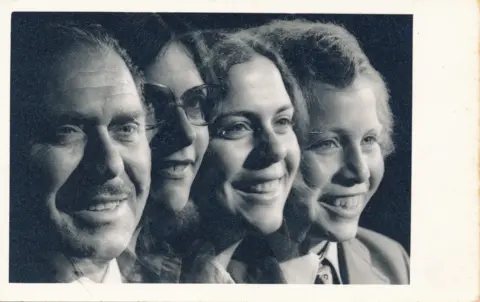 The Liebouts family
The Liebouts family“If I were younger, I think I would feel very hate towards you,” I told her and I was resisting my tears. “But I do not do it because saying all these things was really difficult to recognize it.”
“Give me your hand,” says Cornelia as it explodes. “This is important. Your tears and touch you touched me … My grandfather was a train driver in Auschwitz. What can I say? Nothing.
“I can’t apologize, this is not possible,” she added, indicating that the crime is very serious. “My grandfather was very guilty, and he died of his guilt.” Cornelia thank me for my openness and says that there is a need to completely reveal the date.
Then she said something that you might not expect, which is that some Germans were from Shunwald, where her family came, they had angrily interacted with her research. The Polish city that was renamed Pogkov, which is about 100 km from Krakow, did not reconcile with its Nazi past.
Cornelia explains that the city was originally against the ideology of the Nazi party, but over time, it became consumed by it. Hitler saw that Chunwald is a typical village – Arya village in the Slavs land. He hoped that the “fifth column” of German race would become a useful help in the army.
The site was the site of the Glyvits incident, a false science incident organized by Nazi Germany in 1939 to justify the invasion of Poland, which is one of the reasons for the outbreak of World War II. In 1945, near the end of the war, it was the first German village to be attacked by the advanced Soviet forces.
But immediately before that, it was a theater for one of the alleged death marches by the Nazis.

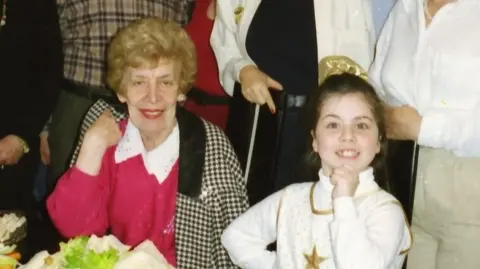 The Liebouts family
The Liebouts familyAs the Soviets approached Auschwitz, Hitler’s elite guards, the Special Security Forces, forced about 60,000 prisoners there – most of them Jews – to move to the West. In the period between 19 and 21 January 1945, one of these marches passed through Shunfald. At fewer temperatures than freezing, prisoners were wearing only the high scheme with wooden shoes in their feet. Those who collapsed from hunger and exhaustion were shot.
Those who survived the open livestock vehicle trains in the west, usually placed to other detention camps, such as Boukhnafald. The Nazis wanted to stick to their slave work, and even at this stage, some still believed in the victory of the third Reich in the end.
The history teacher and local religion, Christophe Kroszelski, took me to the main street where the death march passed. People are waiting for their bus to ride outside the main church on Rollynikov Street – known as Power Stransa in the German era. He referred to the ground, and he told me that these are the original stones that the prisoners had to walk.
He says, “It is a silent witness to the march of death.” “But the stone cannot speak.”

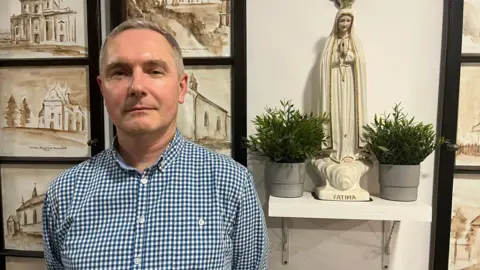 John Murphy
John MurphyThis date has been buried so far – this is partly due to the having of the Germans from Shunwald to flee after the Soviet attack, which came shortly after a period and the Polish resettled the village. A German -Polish woman in her eighties, called Rota Casupik, told me how drunk Soviet soldiers stormed her family’s house and killed her father. But there is another reason: the active repression of the past.
It did not surprise me that some Germans had negatively responded to Cornelia’s research. Germany is proud of itself ErinnerungskulturOr a culture of remembering: mandatory education of Holocaust, museums and memorials. But many see that this is the tasks of the state and the government. Although they are happy enough to confront the past in a merely, it is difficult to deal with the history of their families, says Benjamin Fisher, the former Jewish student leader and political advisor. It calls it “removing the exclusivity of history.”
A Study at the University of Belveield I found that a third of the Germans believed that their family members helped save the Jews during the Holocaust. Benjamin says this is “ridiculous”, and “statistically impossible.”
On Earth in Boikov, 80 years after the March of Death, things began to change. Last week, a delegation of Germans, Jews and Poles, including local authorities, schools and emergency services, revealed a new memorial to commemorate those who died in the city’s death march.

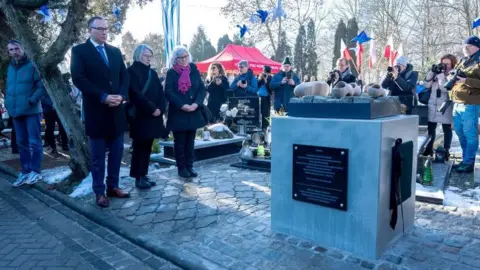 Ipn k. łojko
Ipn k. łojkoCornellia and Cretestov were there. For Cornelia, history is very personal. It is convinced that its study and remembering it is essential to understand how society can change so quickly. I am grateful for that. Their work and passion gives me hope in a world where anti -Semitism is increasing – as I try to keep the memory of how my family was killed alive.
Shunwald residents believe that their city is located at the top of culture and high spirituality. Cornelia says the matter “then turned into immorality.” “This is an evolution that we must understand … not only good or bad. People can go to good, but very quickly job functions, [find themselves] On the wrong side.
“We cannot change the past. We cannot go back. But it is important to talk about this, to remind people of what happened, to remind people of what humans can do to each other.”
https://ichef.bbci.co.uk/news/1024/branded_news/17de/live/67f09910-da73-11ef-a37f-eba91255dc3d.jpg
2025-01-25 01:33:00

